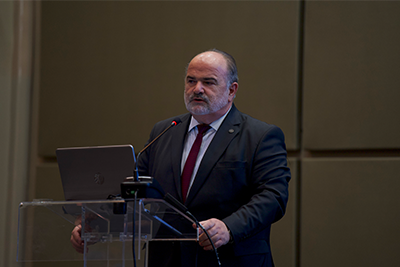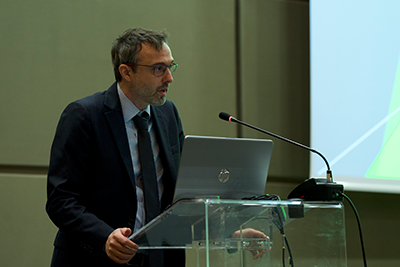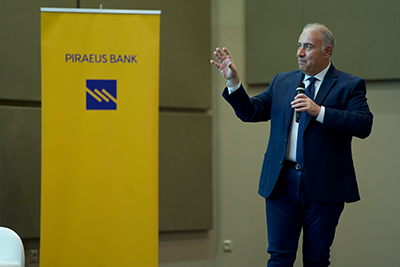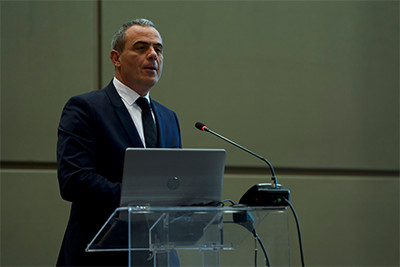Tax reforms, more favorable lending, energy stability, the top demands of the Catering industry
An important Workshop on the issues high on the agenda of the Catering industry concluded on Sunday, February 11, day three of HORECA 2024.
Fist speaker of the Workshop was the head of the Panhellenic Federation of Restaurants Enterprises (P.O.E.S.E.), Mr. Giorgos Kavvathas who mentioned how sparing the state has been in supporting restaurants with subsidies – which were given much more generously to other sectors as a result of the Covid crisis – at a time when the catering sector, as he pointed out, offers more than 400,000 jobs throughout Greece, as it is among the top 3 “employers” of the country, contributing 8 billion in GDP.

George Kavathas

Return to investment lending, with better terms than the banks
The positions of the first panel of guests were particularly enlightening, with Mr. Nikos Daskalakis, Assistant Professor of Finance and Accounting at Panteion University, stating that we are in a positive momentum for strengthening the financing of small and medium enterprises from banks. As Mr. Daskalakis explained, through the NSRF programs, there is a slight decrease in investments from equity capital, while the availability of banks to grant investment loans has increased. This indicator reveals the tendency for entrepreneurs to return to the banking pool to raise investment capital.
For his part, Mr. Stelios Iliadis, General Manager Retail Segments Strategy & Sales of Piraeus Bank, spoke about the awareness that banks have overall of the difficult financial situation of catering businesses and recognized that the self-financing that businesses often resort to, is not a sound investment strategy. He spoke of new loan products that are just beginning, with greater participation-involvement of banks. However, there were valid reactions from professionals present, who underlined that the strict conditions set by the banks, such as the absence of previous debts, the imposed guarantee and the complexity of the criteria in the submitted applications, prevent professionals from knocking on the banks’ doors, with the fear of rejection.

Nikos Rogakos

Tax reforms, cooperation and realism in IAPR requirements
The positive face of the Independent Authority for Public Revenue (IAPR) was shown to the professionals by its Governor, Mr. Giorgos Pitsilis, who emphasized that the “line” emanating from the IAPR regarding the control of businesses is that there should not be an acutely punitive attitude, while he underlined that the legality is consistently the path that favors professionals. In comments made by participating businessmen, coming from many parts of the Region, mainly islands, on the “aggressive” behavior of some auditors who consider the owners by definition “guilty” and on the alleged referral of businesses – which are sealed for 48 hours, with special markings for tax violations – visible to anyone passing by – Mr. Pitsilis informed that the consent directive has already been given to the audit mechanism.
He argued, however, that some of the persistent violators have factored the cost of the fine into the general operating cost of their business, and the tactic of exposing them to the local community is weighted as more of a deterrent to subsequent violations. Finally, he announced corrective interventions to be carried out in my data and in its connection with e-sent, which will reduce the digital “ bureaucracy” of data transmission to IAPR.
For his part, Mr. Vassilis Kampanis, President of the Panhellenic Federation of Tax Professionals, pointed out the focus that should be made by the IAPR on the technical obstacles organically brought by the data transmission system (when, for example, all the receipts have been legally “cut”, but they cannot be forwarded to the Independent Authority, due to the inability of the internet provider to work – an existing problem that several of the businessmen present confirmed from their personal experience).
Mr. Pitsilis argued that the system itself includes some safeguards for similar cases and urged professionals to educate themselves on the idea that the transmission of data is an “independent obligation” of businesses. It was however committed to further facilitating entrepreneurs with targeted interventions. The panel closed with an invitation from the head of IAPR to the representatives of POESE, as well as the presidents of local unions, to set up meetings with him and the competent officials of the Authority in order to examine ad hoc the problems that have been identified, both overall and by region.
Renewable energy sources and energy “training” of professionals, the answer to the crisis
“The cheapest energy is the one that is not consumed” said Mrs. Alexandra Sdoukou, Deputy Minister of Environment & Energy, hastening to clarify that in no case is she urging catering business owners to make “discounts” for proper operation of their stores by reducing the use of electricity. On the contrary, she emphasized that – within this energy environment – entrepreneurs should be trained to make the most of the possibilities offered to them by the providers, making sure that they also take advantage of the savings tools available to them.
As for the present and the future of the energy market, the deputy minister emphasized that they are based on the dipole 1) Optimization & rationalization of energy use and 2) Stability & predictability of costs. She said that programs are already “running” to replace equipment with new smart devices, while at the same time she announced that new programs will begin to be implemented in the spring that will turn professionals even more towards renewable energy sources, which, according to her statement, they are the future of corporate energy autonomy.
Ms. Sdoukou also mentioned that the Greece’s energy mix has been upgraded in the last four years, with lignite now making up less than 10% of it, explaining that this reform is something that will be of particular concern to us in the near future as the European Union will continue to push for ever more stable and specialized “clean” power laws. Then Mr. Efthimios Zervas, Professor of the School of Applied Arts and Sustainable Design of the Hellenic Open University presented a very interesting research on energy costs. It reflects the difficulty of more and more companies to respond in time to the repayment of their debts to providers, with more than half paying their bills sporadically and irregularly. The survey also revealed the dissatisfaction of professionals with electricity prices, who in a percentage of over 95% consider them to be high to very high.
Color-coded invoices: when and for whom
The presentation of color-coded invoices and the energy options of businesses by Mr. Christos Danelatos, founder and managing director of Delta Energy Consultants, was very detailed, who reminded that businesses have stopped receiving state aid for energy as of December 2022. Mr. Danelatos guided the attendees on the correct way to calculate a competitive bill, on the secrets of color-coded invoices (the dynamic orange invoice is in the process of being processed), informed about the profile of the business/entrepreneur to whom each type of invoice is addressed and finally predicted a gradual decline in energy prices through May. It will follow, as he underlined, the expected increase, due to the greater demand in the summer months and until autumn – all this, of course, in conditions of geopolitical stability, he stressed.
In the conclusion, Mr. Leonidas Vatikiotis, Scientific Officer IME GSEVEE, presented an extremely interesting panhellenic research on the Evaluation of the Energy Impact in Catering SMEs. It showed that the cost of energy (electricity and other fuels) is increasingly burdening professionals, who have put energy bills at the top of their list of debts to settle. In addition, as was realized, the overall energy burden works as a deterrent for the opening of new businesses or the expansion of existing ones, while the common desire/need of the professionals who participated in the research is the stabilization of its price downwards on an annual basis and the return of subsidies so that their businesses can breathe.
The POESE conference was chaired by the journalist Mr. Nikos Rogakos.










